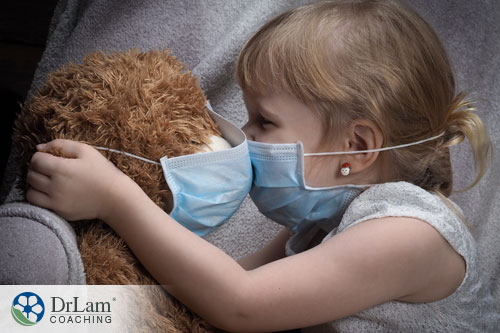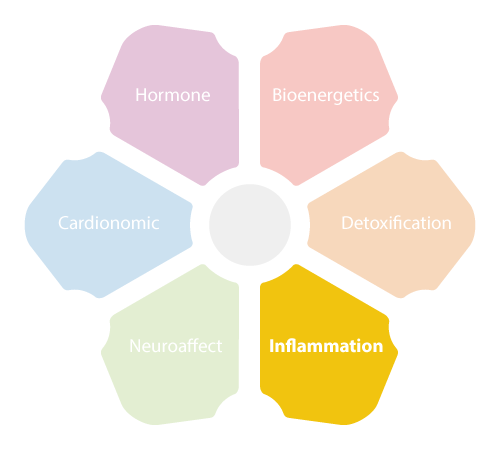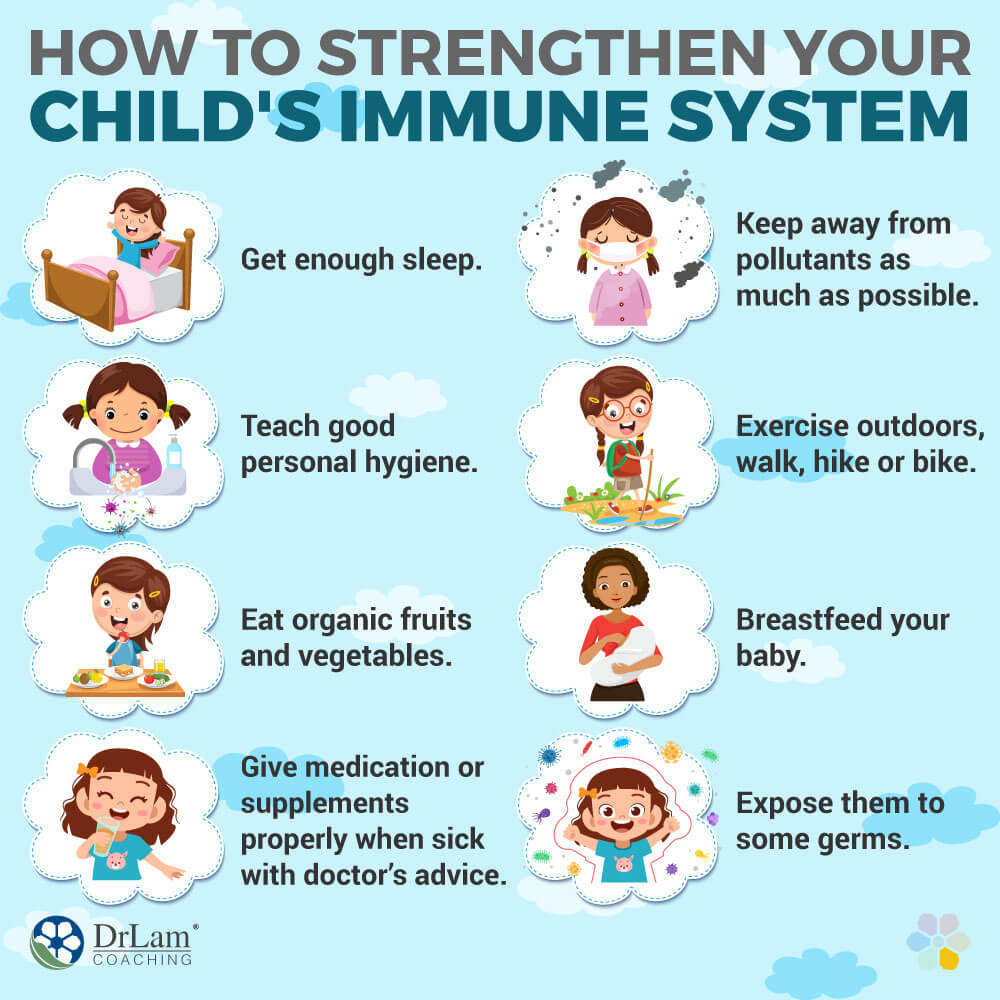 Children are often more susceptible than adults to colds, the flu, and other health conditions caused by viruses and germs. This is because the child's immune system is still developing and will continue to develop all throughout life.
Children are often more susceptible than adults to colds, the flu, and other health conditions caused by viruses and germs. This is because the child's immune system is still developing and will continue to develop all throughout life.
While most people are aware of the immune system—in a general sense, as something that's there to protect you from illness—not many of us really know how it works and what we can do to make it stronger. This is especially the case where your child's immune system is concerned.
The immune system is your body's first line of defense against any type of foreign invasion, e.g., bacteria. You may think sterilizing your home will remove these foreign invaders. And while this may help to a certain extent, the truth is you cannot eradicate all germs from your life. Germs and bacteria are all around us, in the air we breathe and just about anything we touch. And this is where your child's immune system jumps into action, fighting off these invaders to keep your child healthy.
Your child's immune system plays a role in nearly all of the functions in the body. For example, immune cells are:
In short, your child's immune system ensures their survival.
The immune system has three core components: innate, adaptive, and passive.
Innate immunity refers to natural immunity, i.e., the immunity you're born with. This is your child's first line of defense and includes all external body barriers like the mucous membrane lining of the nose, throat, and skin. If, however, this line of defense is compromised, e.g., your child falls down and skins a knee, special immune cells in the skin attack any foreign invaders like external bacteria.
Adaptive immunity will develop throughout your child's life, as they are exposed to different viruses and bacteria.
Passive immunity is attained from another source, like a mother's breast milk, for example. This type of immunity may be temporary, but ensures a baby's survival during the early years of childhood while the immune system is still under construction.
You have to remember, though, that no two people are alike, and one child may be more susceptible to infections, whereas another always seems to have a clean bill of health. As your children get older, they will become more immune to foreign invaders and should be able to fight off germs more easily. A teenager, for example, may get fewer colds than his younger siblings, even though they live in the same home. This is because the immune system of a teenager can easily recognize and attack cold-causing viruses while their younger brother's or sister's immune system is still learning to do this effectively.
Passive immunity fades over time, but the innate and adaptive immune systems stay with your child throughout their life. However, these two immune systems are not independent, but complement each other in their separate responses to the pathogens or harmful substances they encounter.
Your child's immune system has three main tasks to fulfill:
 Inflammation is how your body responds to any type of stress and part of your body's immune response. For example, if your child falls and gets a cut, their immune system kicks in and quickly sends immune cells to the area to guard against infection. At the same time, inflammation occurs leading to the associated symptoms of redness, swelling, and heat. At this stage, leukocytes, i.e., your white blood cells, spring into action, flowing through the bloodstream to the injured area to fight off foreign pathogens. Leukocytes are made in your bone marrow and stored in blood and lymph tissue. White blood cells are essentially responsible for your immunity.
Inflammation is how your body responds to any type of stress and part of your body's immune response. For example, if your child falls and gets a cut, their immune system kicks in and quickly sends immune cells to the area to guard against infection. At the same time, inflammation occurs leading to the associated symptoms of redness, swelling, and heat. At this stage, leukocytes, i.e., your white blood cells, spring into action, flowing through the bloodstream to the injured area to fight off foreign pathogens. Leukocytes are made in your bone marrow and stored in blood and lymph tissue. White blood cells are essentially responsible for your immunity.
But stress is not only physical in nature. It can also be the result of psychological and environmental factors. If your body is presented with anything it deems a threat—whether external or internal—your immune system immediately responds by sending leukocytes to the area. Inflammation begins the moment your immune system starts defending your body, resulting in dilated blood vessels with porous walls that allow leukocytes to freely move into the damaged area. The pain and swelling commonly experienced are caused by the buildup of fluid at the site of injury or infection, which puts pressure on nerves in the area. And heat is generated by increased blood flow to the area.
Factors that can cause inflammation, among many others include:
But what does inflammation have to do with your child's immune system? It's simple: your child's Inflammation Circuit is influenced by their immune system, gut, and microbiome, which are closely connected; therefore, any imbalance in one of these can directly affect the others, which could mean triggering inflammation. Cortisol production can be a factor, when it comes to imbalances in your children's immune system, inflammation, gut issues, and the microbiome.
 Your body's response to stress is governed by the Hypothalamic-Pituitary-Adrenal (HPA) axis. The hypothalamus (located in the brain) sends chemical messengers to the pituitary gland (also in the brain), which, in turn, sends its own set of chemical messengers to the adrenal glands, resulting in increased cortisol output. This process is referred to as the NeuroEndoMetabolic (NEM) Stress Response and is 100% automatic. You cannot control it.
Your body's response to stress is governed by the Hypothalamic-Pituitary-Adrenal (HPA) axis. The hypothalamus (located in the brain) sends chemical messengers to the pituitary gland (also in the brain), which, in turn, sends its own set of chemical messengers to the adrenal glands, resulting in increased cortisol output. This process is referred to as the NeuroEndoMetabolic (NEM) Stress Response and is 100% automatic. You cannot control it.
The increase in cortisol limits your inflammatory response, thereby increasing your immune response. However, if stress persists, your cortisol output will remain high or may even increase and your inflammatory response could go into overdrive. This can result in diverse symptoms—for example, anxiety or depression—which cause even more stress and further increase your cortisol levels. At the same time, high cortisol levels can affect leukocyte production. In the case of your child's immune system, this could potentially affect its ability to fight off disease.
But while your child's weakened immune system may be the cause of recurring infections, this is not always the case. Sometimes an overactive immune system can be the cause.
Under normal circumstances, your child's immune system only targets pathogens deemed to be a threat and beneficial bacteria are left alone. But if the Inflammation Circuit becomes a little bit overzealous, it can trigger an immune response against ‘normal' cells of your child's body. If this happens, the antibodies in the blood may start to indiscriminately attack tissues, targeting not just pathogens but normal cells as well. This can lead to the development of certain autoimmune conditions. Interestingly, autoimmune conditions seem to be more developed in children in developed countries compared to developing ones. One reason may be the Western diet or standard American diet, which includes many inflammatory foods. Another is a lack of exposure to pathogens that would otherwise equip the immune system with the ability to recognize and attack them. According to the latter theory, a child's immune system could become overactive and attack healthy tissue by mistake.
Some of the most common autoimmune conditions found in children are:
As a parent, it's natural to be concerned about your children's health. But did you know that it's perfectly normal for children to get colds, flu, and ear infections about six times a year? Although your child may feel miserable at the time, they're building up antibodies and strengthening their immune system while fighting off the infection. There are a number of things you can do to help ensure your children's immune system can handle these situations.
 A child's body grows and heals during sleep cycles. According to numerous studies, children that don't get enough sleep are more susceptible to infection because their immune systems are weaker than those who do get enough sleep. Typically, a baby should be sleeping up to 18 hours a day (if you're a lucky parent!), while toddlers needs up to 13 hours and children in preschool should be getting up to 10 hours of sleep.
A child's body grows and heals during sleep cycles. According to numerous studies, children that don't get enough sleep are more susceptible to infection because their immune systems are weaker than those who do get enough sleep. Typically, a baby should be sleeping up to 18 hours a day (if you're a lucky parent!), while toddlers needs up to 13 hours and children in preschool should be getting up to 10 hours of sleep.
Teaching your children good personal hygiene from a young age will help to reduce stress on your child's immune system. This means teaching them to wash their hands before and after meals, after playing outside, and after using the bathroom or blowing their nose.
Organic fruit and vegetables have many immune-boosting properties like carotenoids and vitamin C. These properties may aid in the production of leukocytes and antibodies that fight pathogens and also protect against heart disease and cancer.
Antibiotics can kill healthy gut bacteria along with the bacterial infection. Moreover, taking antibiotics for a viral infection does not work and could potentially result in gut dysbiosis. A good vitamin C supplements may be more effective for cold and flu prevention and as a remedy.
Besides being a potential cause of cancer, secondhand smoke, contains thousands of toxins that can target cells in your child's body. They may affect a child's immune system more than an adult because the natural detoxification processes and immune systems are still developing in children. Also take care with chemicals you use at home, as many of these could adversely affect your child.
 According to research, exercise promotes leukocyte production. Taking the family for a walk, hike, or bike ride can therefore boost both you and your child's immune system.
According to research, exercise promotes leukocyte production. Taking the family for a walk, hike, or bike ride can therefore boost both you and your child's immune system.
Many antibodies are passed from the breastmilk of a mother to her baby, which can enhance a child's immune system during the younger years. In addition to its immune-boosting properties, breast milk may also enhance your little one's brain power while protecting them from certain forms of cancer, diabetes, colitis, and other health conditions later in life.
Don't be afraid to expose your child to some germs. In other words, while keeping your home clean and tidy is important, a sterile environment may do more harm than good. Minimal exposure to potential germs means your child won't build up the antibodies required to fight off infections. This can lead to future health problems. A cold or flu now and then will strengthen your child's immune system allowing them to become immune to certain viral and bacterial strains. Thus, making it easier for your child's immune system to stave off disease as they get older. A robust immune system can easily identify and fight off potential health threats to your child's body may encounter.

While considering threats to your child's immune system, it's important to remember that not all ‘germs' are bad and immunity is something built up over time. If your child gets a cold or the flu it does not mean you're a bad parent or that you're not meeting your child's needs. Rather, it is a perfectly normal part of growing up and allows your child's body to develop the antibodies it needs to fight infections. Of course, there are certain precautions you should take in terms of looking after your child's immune system including those mentioned above. And overall, they are pretty easy to implement. If your child has a history of recurrent infections or a weak constitution, you can take steps to help boost their immune system. For instance, eating healthy unprocessed foods can help prevent inflammation. If your child experiences recurrent upper respiratory tract infections, consider a nasal rinse or halotherapy but try to avoid frequent use of antibiotics. Children with fatigue can benefit from non-stimulatory adrenal support if properly supervised. However, it's important not to overload children with too many supplements since this can create dependencies and tolerances which can end up being dangerous in the long term.
© Copyright 2020 Michael Lam, M.D. All Rights Reserved.
Breastfeeding does affect your child's immune system. It provides your children the antibodies they need to fight infections when they're young. As they grow, however, the immune system naturally develops and should be able to fight off foreign pathogens on its own.
